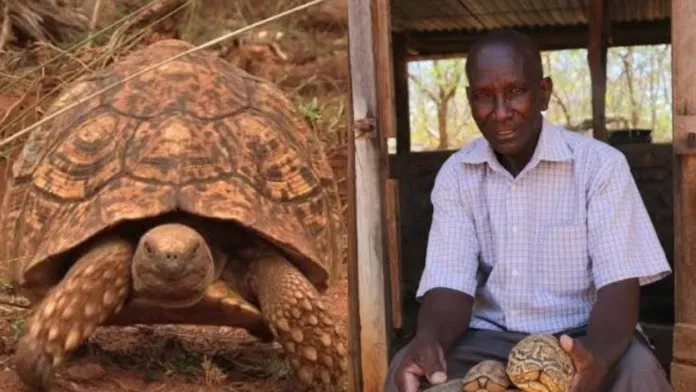In 2005, Peter Maundu began rearing tortoises after multiple failed attempts at crop farming. In an interview with KU TV, Maundu shared that he started with just 25 tortoises. “The land is dry, and there isn’t enough vegetation, although I manage to get some food from my farm near a river,” he explained.
By 2019, fourteen years after his venture began, Maundu was overseeing a thriving population of over 2,000 tortoises across his farms in Kitui and Makueni Counties. He specializes in three tortoise species: hinge-back, pancake, and leopard tortoises.
Maundu exports these tortoises to countries where reptiles are consumed, including the United States, China, and Germany. As an entrepreneur in international trade, he identified currency fluctuations as his main challenge. Additionally, he expressed concerns about unreliable clients, particularly those who delay payments. “Sometimes the market is challenging because I don’t deal directly with clients; I have to go through agents,” he noted.
Tortoise farming is a unique form of agriculture that plays a significant role in species conservation and population management. Tortoises inhabit diverse environments, from arid deserts to lush tropical forests, and are found on every major landmass except Australia and Antarctica. Primarily herbivorous, they feed on leaves, flowers, and fruits, though some species in damp forests may occasionally consume animal matter.
Successful tortoise farming requires an understanding of their natural habitat and dietary needs. Breeding tortoises involves a fascinating lifecycle, with female tortoises typically laying small clutches of fewer than 20 eggs, which they bury in sandy or soft soil for natural incubation. The incubation period ranges from 60 to 120 days before the hatchlings emerge. Unfortunately, hatchlings face a low survival rate, with only 2-5% reaching adulthood in some species due to predation and environmental challenges.
The primary threats to tortoise populations include habitat loss due to urbanization, agriculture, and deforestation, as well as poaching for the pet trade. Tortoise farms can play a critical role in conservation efforts by providing protected habitats for endangered species and reducing the pressure on wild populations. By breeding tortoises in controlled environments, these farms contribute to the sustainability of species at risk of extinction.



